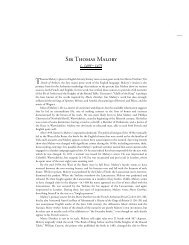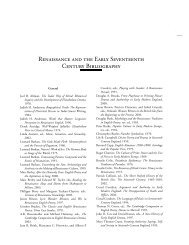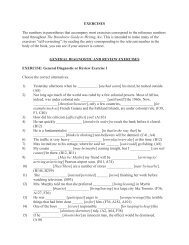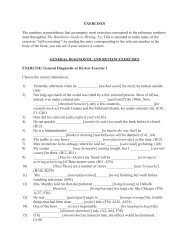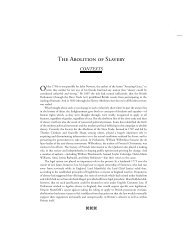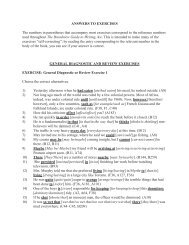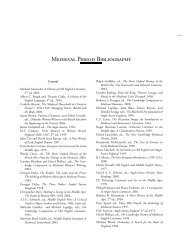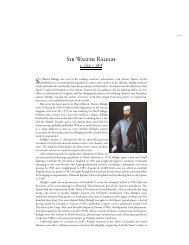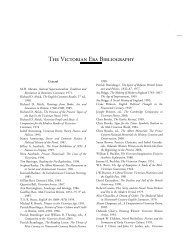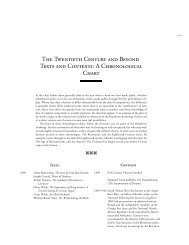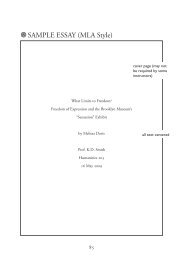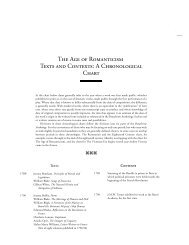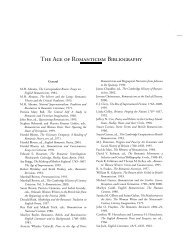Thomas Lodge - Broadview Press Publisher's Blog
Thomas Lodge - Broadview Press Publisher's Blog
Thomas Lodge - Broadview Press Publisher's Blog
Create successful ePaper yourself
Turn your PDF publications into a flip-book with our unique Google optimized e-Paper software.
450<br />
455<br />
460<br />
465<br />
470<br />
475<br />
480<br />
Editha followed him and with amiable persuasions<br />
animated him with hope, he had surely in that<br />
ecstacy 1 miserably ended his old years. But Robert,<br />
instead of repenting his offences, began to renew<br />
his follies, quarrelling with his father’s guard in<br />
such manner that every man, knowing his natural<br />
inclination, fled his company as being a monster<br />
among men. If any grave old man came near him<br />
attempting to counsel him, after he pretended<br />
some diligent attention for a while, he suddenly<br />
took out his knife and cut off his beard, satisfying<br />
the party wronged with this ironical reason:<br />
Quae superflua sunt, abscindenda sunt. 2<br />
Whilst in this manner he misgoverned himself<br />
among the courtiers, Editha was not unbusied in<br />
the closet, but so laboured her husband by<br />
entreaties and tears that (since Robert her son was<br />
about 21 years of age and able to bear arms) he at<br />
last consented to grant him the Order of Knighthood,<br />
alleging these reasons: that honours are the<br />
spurs of virtue, and natures that are forward in<br />
wickedness by conversing with the virtuous are<br />
reformed. Nought left she unsought that might<br />
insinuate, nothing unreported that could persuade.<br />
To be brief, the prefixed day of his knighthood<br />
was appointed, and his arms were delivered him;<br />
the nobles of the country were assembled; the<br />
ladies were orderly invited. Neither did Aubert<br />
spare any cost to show his magnificence or Editha<br />
any counsels to reform Robert’s mind, but, calling<br />
him apart into her privy chamber, she began in<br />
this manner to advise him:<br />
“If my secret complaints, thou sinful young<br />
man, had not more effect to mitigate the heavens<br />
than to move thee, I would dry them up and defy<br />
thee. But since they are piteous and respect<br />
prayers, I will weep for thee to win them to thee,<br />
in hope they will be as favourable in mercy as I am<br />
forward in moan. Oh, more obstinate than the<br />
1 ecstacy the state of being “beside oneself ”; here, thrown into a<br />
stupor with anxiety, fear or passion.<br />
2 Latin, “Those things which are superfluous [or superabundant],<br />
have been cut off.”<br />
T HOMAS L ODGE<br />
485<br />
490<br />
495<br />
500<br />
505<br />
510<br />
515<br />
14<br />
northern wind, more indurate 3 than the hard<br />
marble, more cruel than the Libyan lioness, more<br />
perverse than the Lydian tyrant! 4 Thou hast open<br />
ears to conceive mischief, but a dull heart to consider<br />
of modesty. I see thy repining 5 looks, thy<br />
reprovable lewdness. Thou despisest to hear my<br />
prayers or harbour my precepts. Ah, Robin, hath<br />
the care of obedience no force, the credit of a<br />
mother no favour, or art thou proud to see me<br />
woeful or pleased to seek out my wretchedness?<br />
Thou knowest that by nature thou art near me,<br />
that thy folly is my fall, thy vain deeds my very<br />
undoing. If then thou have care of my life, yield<br />
some respect unto my lessons. Thou art now stept<br />
in years 6 and hast judgement to discern errors.<br />
Now call thyself home and record thine old<br />
wickedness. Amend thy life; meditate on thy looseness;<br />
cast a rein on thy nature; conceit 7 the reason<br />
of nurture. Better is a mean life in virtue than a<br />
high estate in vice. Hast thou offended in thy<br />
youth? The misdeed is ordinary. Wilt thou amend<br />
in age? Oh, the action is honourable! I conjure<br />
thee, my son, by these devout tears, by these<br />
devout entreaties, by the name of thy mother, by<br />
the necessity of obedience to exchange thy excess<br />
to mediocrity, 8 thy murder to modesty, thy untowardness<br />
to staidness, 9 and prepare thyself to<br />
accept the Order of Knighthood which thy father<br />
will bestow on thee on tomorrow day, being the<br />
feast of the nativity of St. John Baptist. For arms<br />
I will furnish thee; for attendants I will send them<br />
thee. Only, prepare thyself presently to watch 10 in<br />
the Abbey of St. Peter’s (at this day called St.<br />
Owen’s in Rouen), and bethink thee so to behave<br />
3 indurate callous, unfeeling, hardened.<br />
4 Lydian tyrant Gyges, (c. 680-645 BCE) king of Lydia. He is the first<br />
ruler whom the Greeks labelled “tyrant,” presumably for murdering<br />
King Candaules of Lydia, usurping the throne, and marrying his predecessor’s<br />
widow.<br />
5 repining discontented, dissatisfied; rebellious.<br />
6 stept in years advanced in years; grown-up.<br />
7 conceit understand.<br />
8 mediocrity the mean or “middle ground” between extremes.<br />
9 staidness sobriety of character, manner, conduct.<br />
10 to watch remain awake [usually all night] for purposes of devotion;<br />
to keep a religious vigil.



